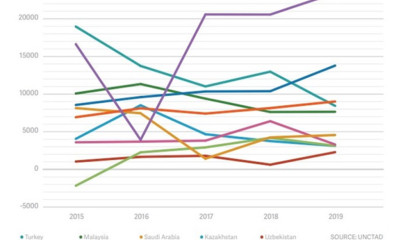The key problems of the agro-industrial complex in OIC countries can be considered low investment activity and attractiveness, technical equipment, the financial instability of agricultural producers, the impact of climatic conditions.
In general, agricultural development and food security in a country can be improved by increasing agriculture output, particularly food products, through either increasing agricultural productivity or extension of the arable land area. This, of course, necessitates the availability of appropriate investments in agriculture sector at the national level and/or in terms of foreign direct investments (FDI). However, while investment in agriculture is a well-established economic activity in the developed countries, it is still lagging behind in many developing countries, particularly in the least-developed and low-income agricultural-based countries.

As showed in graph; Indonesia, the UAE, and Egypt led the OIC in FDI inflows in 2019, with inflows steadily increasing over the last five years. The ranking differed slightly when it came to greenfield FDI projects, with Egypt, the UAE, and Saudi Arabia leading the top 10. The pandemic has had a dramatic impact on FDI. According to the UN Conference on Trade and Development (UNCTAD)’s World Investment Report 2020, global FDI will decrease by up to 40% in 2020, bringing FDI below $1 trillion for the first time since 2005.38 FDI is expected to fall by 5 to 10% in 2021 and begin to recover in 2022 as the global economy recovers.
Investments crossing international state borders are essential for the advancement of economic and social integration all over the world. Investment Promotion Agencies (IPAs) play an important role in attracting these investments, as they are often the public face of governments seeking to promote economic and social development.
IPAs are generally instrumental in negotiating investment treaties and concluding investment contracts. Consequently, they also manage investment relationships through after-care services. In addition, FDI from developing economies to other developing economies, the so-called South-South investments, also gained in importance, creating beneficial spillovers globally, thus contributing directly to welfare and prosperity.
In line with above suggestions regarding an important role of IPAs in attracting investment, there are needs closely to work with IOFS enabling the creation of these additional linkages as well as steering and assisting IPAs to reach their full capacity and be the global reference point for FDI.
In this regard, on September 2020, a Memorandum of Understanding was signed between IOFS and KAZAKH INVEST, where special attention was paid to the optimal use of investment operations to support sustainable agricultural development with an emphasis on the agroindustry and agricultural technologies. Furthermore, according to the above MoU in January 2021 was signed Action plan with KAZAKH INVEST which is includes a list of bankable investment projects in the food sector. This model documents framework- regulating relations with all OIC IPAs.
This program encourages the intra-OIC trade and investments to build up value chains of domestic food processing, sales networks and develop food clusters, incl. basic agriculture and logistics.
IOFS will continue to promote investment and trade in the agricultural and industrial sectors through its full subsidiary International IFPA (Islamic Food Processing Association) with a special focus on establishing and supporting food clusters in IOFS member countries via quasi-government entities as IPA’s and ECAs, as well as, with international associations such as WAIPA and Aman Union.
In line with above mentioned very important topics, IOFS plans on May 24 at 15:00 (Nur- Sultan time) to hold an online meeting of experts between national investment promotion agencies on the topic «Projects in food industry: perspectives and problems in attracting investments to OIC countries.»
THEMATIC AREAS TO BE DISCUSSED:
1) Investment projects in food and agriculture sector;
2) What actions need to be taken to improve the investment climate;
3) What kind of suggestions to be done its governments on the conceptualization of appropriate investment promotion strategies and regulations to support local food clusters;
4) To share country and regional experience, as well as, best practices in attracting FDI and increasing investment into food sectors in OIC MCs;
5) To develop the OIC directory on food-related investment priorities and map of respective institutional investors.






